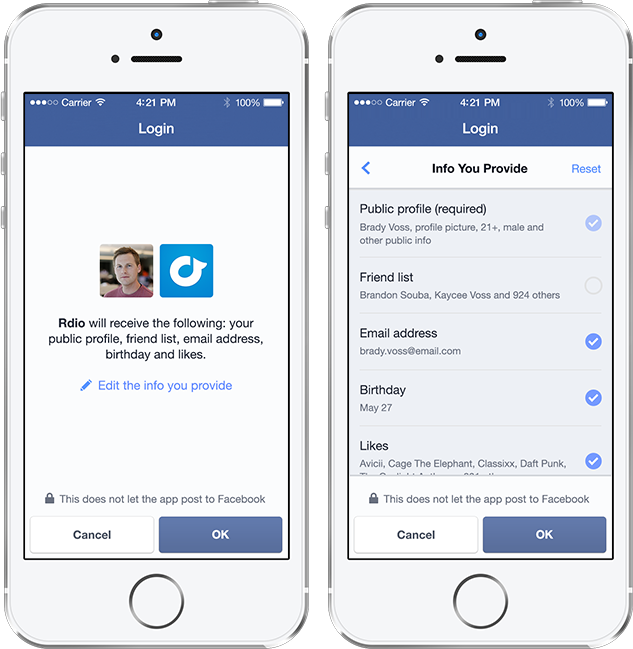Since its introduction, Facebook Login has been one of the most convenient and widely used means of identity authentication across both web and mobile. A quick and simple way for users to sign up for their favorite sites and applications without having to create new login credentials, Facebook Login was used more than 10 billion times in 2013 alone (Facebook Newsroom).
For marketers, social login provides a fantastic way to capture rich, permission-based identity data about consumers directly from the source. The demographic, psychographic, and social graph information housed within social profiles can be leveraged to customize marketing communications and site experiences, resulting in increased conversion rates and engagement.
At last year’s F8 Developer Conference, Facebook announced some significant changes to Facebook Login. Namely, Facebook changed the user experience to give users more control over the profile information they share with organizations upon authentication.
The new experience comes as a result of consumers calling for increased privacy. In Facebook Login’s v2 API, users can decide, line-by-line, which pieces of information they wish to share with apps and websites.

Apps and web-based registration experiences utilizing Facebook Login that were created after April 30th, 2014, are already using the v2 API, and no changes need to be made. Facebook Login experiences that were created prior to April 30th, 2014, must be upgraded to the new v2 API framework before Facebook’s deadline of April 30th, 2015.
In addition to confirming compliance with Facebook’s framework, what steps should marketers and developers take to ensure they can keep providing seamless social login experiences for users, continue to acquire the first-party data needed to power relevant marketing, and build trust with consumers?
Don’t Ask For Unnecessary Information
One of the most beneficial facets of providing the convenience of social login is capturing and using profile data such as likes, locations, and birthdays to create truly customized user experiences. A clothing retailer may use, for example, a user’s likes as a trigger to send the individual a coupon towards a favorite brand. Users have acknowledged that they want customization, as 73% of consumers prefer to do business with brands that use personal information to make shopping experiences more relevant (Digital Trends).
However, businesses should be wary of asking for too much profile data up front, as this can feel intrusive. In fact, studies show that nearly 85% of US consumers have abandoned registering for a site or app because they were uncomfortable with the amount or type of data being requested.
An organization that doesn’t actually have plans to use specific data points should not ask for them. For instance, a consumer products brand with no intention of using an individual’s relationship status for marketing purposes should not ask for that piece of information on the authentication screen.
Instead, brands should ask only for necessary information at the initial touchpoint, and take advantage of progressive profiling to collect additional data over the course of multiple customer interactions.

Be Transparent
In addition to asking for a reasonable amount of profile information from consumers, businesses should clearly communicate how the information will be used, and state the benefits to registering and logging in.
According to a recent Gigya survey, 45% of consumers state that they are more willing to share their information if a brand makes it clear how it will use their data, and 52% of respondents say this same reassurance would make them more comfortable logging in socially.
Telling users how their data won’t be used is arguably just as important as telling them how it will be used. Additionally, businesses should make sure their privacy policies and terms of service are easily accessible from login and registration screens to avoid any surprises.

Customize the Experience
Once a user has authenticated using social login and given a business access to his or her social graph data, the organization must hold up its end of the bargain, and follow through on customizing the individual’s experience. Otherwise, the user has no incentive to continue granting access to his or her profile data, and may even choose to revoke access.
Targeting consumers with generic messaging despite having valuable data on hand can prove especially troubling. Survey results show that after receiving irrelevant information from a brand, 67% of respondents unsubscribed from the email list, 43% of respondents ignored all future communications, and 20% of respondents stopped buying products from the company altogether.
Brands can employ tactics like sending tailored marketing communications with product recommendations, customizing site content, or giving special deals to users on their birthdays. As long as profile data is actually being used for consumer benefit, the business-customer relationship will continue to imbue trust and loyalty.

As Facebook’s deadline to implement the new Facebook Login API looms, brands must be prepared, not only from a development perspective, but also from the perspective of utilizing best practices to encourage social identification.
To learn more about how Facebook Login, as well as social authentication via other third-party identity providers, is beneficial for both businesses and consumers, check out our free Social Login 101 eBook.
This article was syndicated from Business 2 Community: Marketers and Developers: Are You Ready for Facebook Login’s Imminent Deadline?
More Digital & Social articles from Business 2 Community:




